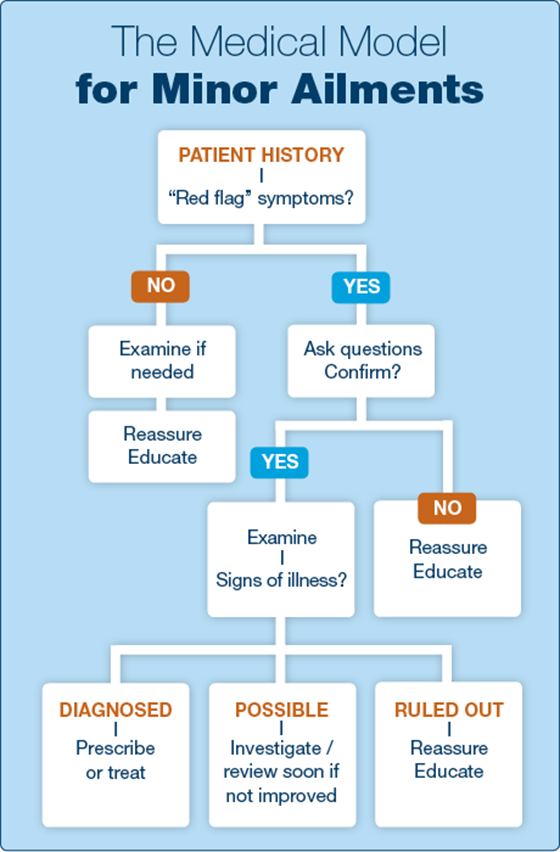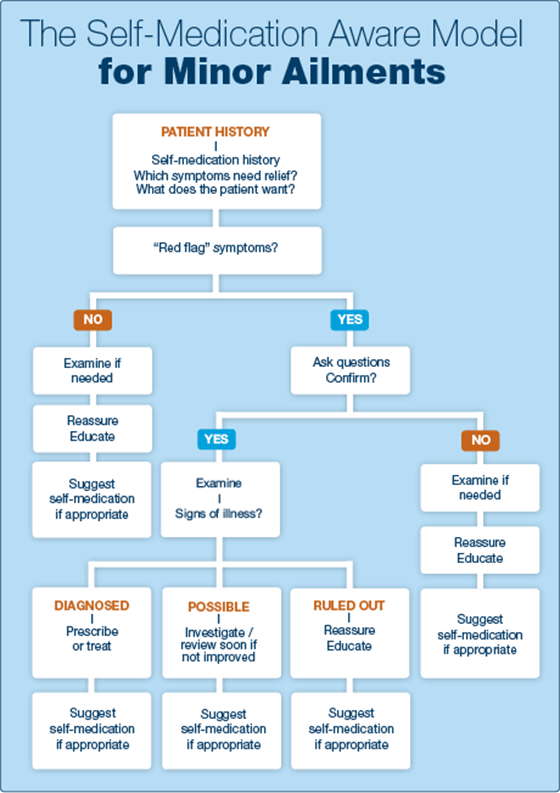An algorithmic approach towards enabling GPs to encourage self care and self-medication in the consultation,
by Dr Catti Moss, FRCGP.
Self Care In Your Consultation
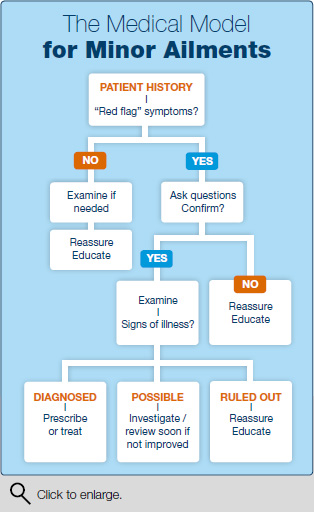
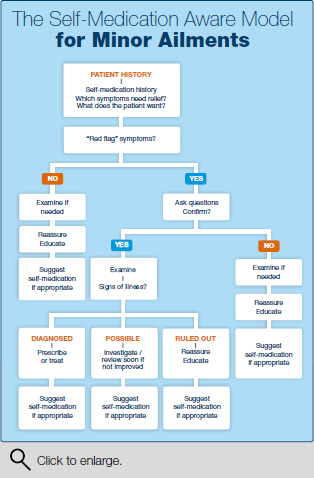
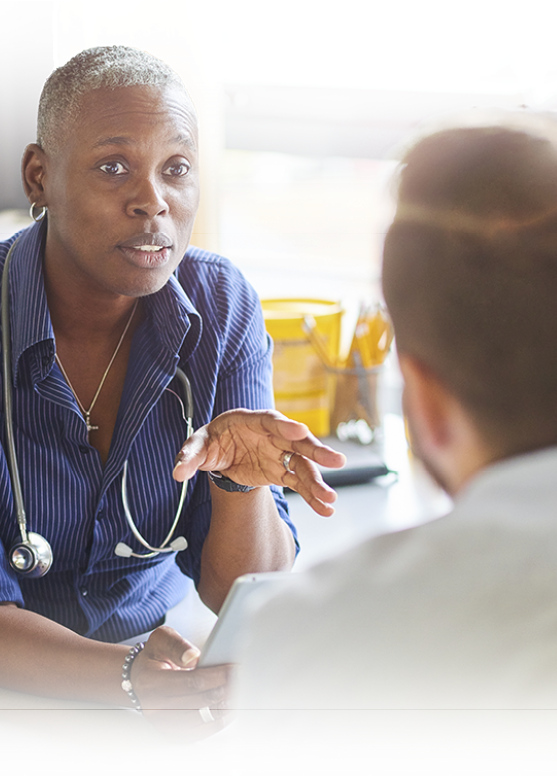
When a GP sees patients with minor ailments there are two priorities:
SPEED and SAFETY.
SPEED and SAFETY.
A doctor only has a ten minute consultation time and, in that time, he or she has to make sure
they have identified anyone with a serious problem, while at the same time reassuring most people
that there is nothing seriously wrong with them and they are going to get better in a relatively short
period of time.
This issue is often resolved by treating nearly everything in case it is a significant illness, and by using the writing of a prescription to “close down” the consultation. This results in over prescribing,
More importantly, it reinforces dependence on the doctor, making patients more likely to return to the GP for treatment of minor illness. In order to control drug spending and to use medicines wisely and appropriately, GPs have been urged to break the cycle of dependency, and develop new habits.
Each doctor probably has their own list of red flag symptoms, but they include: haemoptysis, pleuritic pain, and a history of diabetes.
The Medical Model works well at distinguishing the serious from the minor ailment. Where many GPs find difficulty is with the “reassure and educate” part, which terminates the consultation. Both doctor and patient have been trained to use the writing of a prescription to mark the ending of a session, so GPs find that reassuring and educating takes longer than the writing of a prescription and they start to run late.
The other person whose needs may not be met is the patient. Patients frequently come to the doctor for a “cure”, when appropriate symptomatic relief is relevant and readily available in the community pharmacy.
The doctor also finds out what the patient wants from the visit and, in the process, they may discover that fewer patients want a prescription than they had thought.
The doctor then proceeds with the medical side of the consultation, finding or eliminating any serious illness. Now, at the end of the consultation, the doctor has what he or she needs to end the proceedings without an unnecessary prescription.
If the patient only wanted reassurance, the doctor will feel happy to do so briefly, without feeling that the patient is dissatisfied. If the patient wanted symptom relief, the doctor can now recommend a trip to the pharmacy to get something appropriate. This can take into account the OTC treatments that have already been tried.
This is a good opportunity for GPs to issue a recommendation prescription, noting down symptoms and recommendations for suitable OTC products, or other action such as exercise or dietary changes
If the patient gets free prescriptions and does not have enough money to buy symptom relief, many of these items are available on prescription and are not expensive. Most people, however, would prefer to buy their medicines, especially if it saves them a prescription fee. For this model to be truly effective, the GP must be familiar with OTC medicines.
 A “How to” guide to help you form your strategy
A “How to” guide to help you form your strategy
 Top tips for GP practices
Top tips for GP practices
 Evidence-based self care information for your websites
Evidence-based self care information for your websites
 Self care fact sheets and other self care materials for you to download and give to patients
Self care fact sheets and other self care materials for you to download and give to patients
 Resources to support participation in the annual Self Care Week, a national awareness campaign that promotes self care.
Resources to support participation in the annual Self Care Week, a national awareness campaign that promotes self care.
This issue is often resolved by treating nearly everything in case it is a significant illness, and by using the writing of a prescription to “close down” the consultation. This results in over prescribing,
PAGB defines self care
as the actions people
take for themselves and
their families to promote
and maintain good health
and wellbeing and to
take care of their self-treatable
conditions.
mostly of antibiotics, which not only causes
overspending on drug budgets, but also gives an
unacceptable level of drug side-effects and other
drug-related morbidities.More importantly, it reinforces dependence on the doctor, making patients more likely to return to the GP for treatment of minor illness. In order to control drug spending and to use medicines wisely and appropriately, GPs have been urged to break the cycle of dependency, and develop new habits.
The Medical Model for Minor Ailments
One model the GP can use to distinguish speedily between patients with significant problems and
others, without prescribing unnecessarily, is the Medical Model for Minor Ailments. In this model,
the doctor uses the presence of “red flag” symptoms to alert him or her to the need for a more
intensive search for significant illness.Each doctor probably has their own list of red flag symptoms, but they include: haemoptysis, pleuritic pain, and a history of diabetes.
The Medical Model works well at distinguishing the serious from the minor ailment. Where many GPs find difficulty is with the “reassure and educate” part, which terminates the consultation. Both doctor and patient have been trained to use the writing of a prescription to mark the ending of a session, so GPs find that reassuring and educating takes longer than the writing of a prescription and they start to run late.
The other person whose needs may not be met is the patient. Patients frequently come to the doctor for a “cure”, when appropriate symptomatic relief is relevant and readily available in the community pharmacy.
The Self-Medication Aware Model for Minor Ailments
This model (on the left) has two small adaptations from the Medical Model. The first is that the
doctor not only finds out what the patient presents with, but also finds out what the patient has
already done concerning self-medication.The doctor also finds out what the patient wants from the visit and, in the process, they may discover that fewer patients want a prescription than they had thought.
The doctor then proceeds with the medical side of the consultation, finding or eliminating any serious illness. Now, at the end of the consultation, the doctor has what he or she needs to end the proceedings without an unnecessary prescription.
If the patient only wanted reassurance, the doctor will feel happy to do so briefly, without feeling that the patient is dissatisfied. If the patient wanted symptom relief, the doctor can now recommend a trip to the pharmacy to get something appropriate. This can take into account the OTC treatments that have already been tried.
This is a good opportunity for GPs to issue a recommendation prescription, noting down symptoms and recommendations for suitable OTC products, or other action such as exercise or dietary changes
If the patient gets free prescriptions and does not have enough money to buy symptom relief, many of these items are available on prescription and are not expensive. Most people, however, would prefer to buy their medicines, especially if it saves them a prescription fee. For this model to be truly effective, the GP must be familiar with OTC medicines.
Do you have a self care strategy?
Your team can become more self care aware by implementing a cohesive self care strategy for your practice, network and wider local area.
To help get you started, the Self Care Forum has produced a wealth of free resources for health professionals. These are available online at selfcareforum.org and include:
To help get you started, the Self Care Forum has produced a wealth of free resources for health professionals. These are available online at selfcareforum.org and include:
 A “How to” guide to help you form your strategy
A “How to” guide to help you form your strategy Top tips for GP practices
Top tips for GP practices Evidence-based self care information for your websites
Evidence-based self care information for your websites Self care fact sheets and other self care materials for you to download and give to patients
Self care fact sheets and other self care materials for you to download and give to patients Resources to support participation in the annual Self Care Week, a national awareness campaign that promotes self care.
Resources to support participation in the annual Self Care Week, a national awareness campaign that promotes self care.
